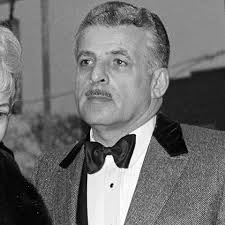Simone DeCavalcante
The New Jersey Mafia is a shadow of what it once was. It fell victim to its own hubris, and to new law enforcement technologies that allowed police and FBI agents to maintain relentless pressure on it. However, in the 1960s the New Jersey mob was riding high. Long a “wild west” area of gang activity, the 1960s saw the DeCavalcante Family rise to prominence and finally bring order to the New Jersey streets. The crime family’s success at rising to the top and making a profit was due entirely to the efforts of one man – Simone DeCavalcante.
Simone “Sam the Plumber DeCavalcante” was the first real Godfather of New Jersey. His leadership and charisma transformed the Jersey gangster scene into something reminiscent of the Five Families across the river in New York. The criminal network that Sam the Plumber built in a short period of time was notorious and legendary; the DeCavalcantes are often said to have inspired the popular Sopranos television series. However, Sam the Plumber was late to the game, as far as Mafia families go. DeCavalcante’s rise coincided with the FBIs adoption of powerful FBI surveillance techniques, which ultimately proved to be his undoing.
The Early Years
Born in Brooklyn to an Italian immigrant family, Simone DeCavalcante soon relocated to Trenton, New Jersey. He often told people that he was descended from royalty, such as an Italian Count. However, no historian has ever ascertained whether or not this was true. DeCavalcante quickly drifted into the world of organized crime. As a youth growing up in the tough New Jersey streets, DeCavalcante proved himself to be a shrewd, effective gangster. He recognized that New Jersey – which was not considered an autonomous territory by The Commission in New York – had tremendous potential for the man willing to take control of it all. And DeCavalcante was that man.
DeCavalcante established a variety of front businesses in Trenton, one of him being the plumbing supply store that gave him his nickname. He involved himself in many of the rackets that helped organized crime thrive in the early and mid-20th Century, such as gambling and loansharking. When his cousin, the New Jersey mafia leader became seriously ill in 1964, Sam the Plumber took over with the blessings of the Commission. The DeCavalcante Crime family had begun.
The Reign of Sam the Plumber
DeCavalcante benefited from ties he had made early on with the New York Mafia. They recognized him as the official boss of the New Jersey mob, which helped tamp down much of the vicious in-fighting that had occurred in Jersey over the previous decades. He also helped build up the number of foot soldiers under his command as well. Prior to DeCavalcante, there were only a handful of truly made men in Jersey; he commissioned dozens more, bolstering his ability to maintain a firm grip on gangster activity in his territory.
While DeCavalcante was a criminal, he maintained a working class sensibility and insisted his crime family operate by an old-fashioned code of honor. He worked to keep the peace across differing New Jersey mob factions, often mediating disputes between rival gangsters to avoid unnecessary violence in the streets. He chastised his subordinates when they appeared unkempt, and even spent time trying to keep underlings’ marriages from falling apart.
Meanwhile, his organized criminal network reached deeper into fabric of New Jersey public life. He developed relationships – often through bribes – with key politicians and powerbrokers. He was in many ways a public figure in New Jersey at the height of his power. The access he bought enabled his crime family to operate under the radar for years, reaping tens of million dollars from illicit activities. However, nothing lasts forever, and it was not long before Sam the Plumber fell victim to changing times and his own complacency.
The FBI placed listening devices in Sam the Plumber’s office in the late 1960s and eavesdropped on him constantly for two years. The Federal surveillance efforts yielded thousands of pages of transcripts and provided the most in-depth window that law enforcement had ever had on the Mafia up until that point. DeCavalcante was tried and convicted on numerous charges related to the tapes in 1969. He was sentenced to 15 years in prison but was released in 1976.
The End and Aftermath
Following his release from prison, DeCavalcante allegedly retired and moved to Florida;

some alleged that he still pulled the strings on his old network in New Jersey, although he was never arrested again for organized criminal activity. He pursued some legitimate business dealings in Miami that never panned out, and died in Florida of natural causes in 1997. Even after his death, the criminal legacy he built in New Jersey continued.
Throughout the 1980s and 1990s, Mafia bosses shifted in and out of control of the empire DeCavalcante had built. Some were arrested and imprisoned, and others mysteriously disappeared. However, after DeCavalcante left for Florida, none of his replacements ever had the political clout that he had or made the rackets as profitable as the days when Sam the Plumber was in control of the DeCavalcante Crime Family.
